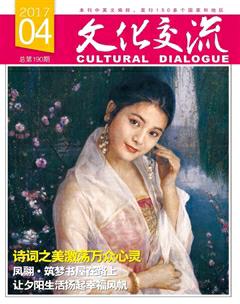越劇視閾中的《牡丹亭》
郭梅
當《牡丹亭》遇見越劇
2016年是明代戲劇家湯顯祖逝世400周年。湯顯祖自評“一生四夢,得意處惟在‘牡丹”。其夢被后人用多種聲腔演繹,還有英、日、德、法等外文譯本傳播于海外,形成這一杰作豐富的外延。
越劇作為一個以浪漫抒情見長的年輕劇種,在對《牡丹亭》的改編中,顯然頗值得關注。越劇改編《牡丹亭》,難度非常之大,完成從曲牌體到板腔體的跨越殊為不易,從55出的傳奇到兩個多小時演完的“大戲”,原著雖然非常經典但幾乎沒有可倚恃之處,必須重起爐灶。幾代越劇藝術家知難而上,陸續推出幾個不同的版本,不斷創新越劇改編《牡丹亭》的歷史。
從20世紀80年代以來,越劇藝術家們一直致力于改編《牡丹亭》,編導有紅楓、李卓云,有呂建華、陶鐵斧,也有顏全毅和周龍、劉平等,主演則是各時期各劇團的臺柱子,而且值得注意的是流派紛呈。
從對昆劇和原著亦步亦趨的“模仿”到有意識的解構和顛覆,從追求“原汁原味”到在保持越劇傳統審美的前提下將現當代人的思考結合進去,服裝、舞美等亦與時俱進,越劇的《牡丹亭》改編演出史,折射的就是這些年來越劇劇種嬗變和發展的歷史。
從“靜安版”到“浙越版”
30余年前,上海靜安越劇團首先把《牡丹亭》改為《還魂記》演出。該劇在越劇唱腔特色中,融入昆曲、滬劇的某些元素,使唱腔更趨飽滿,可以說實現了越劇改編《牡丹亭》“零”的突破,開創之功,功不可沒。但演出該劇的戚派,畢竟以“悲旦”著稱,似與《牡丹亭》的浪漫氣氛不甚契合。
隨后,浙江越劇團也上演了《牡丹亭》。在故事形態和主題呈現上,“浙越版”與“靜安版”一脈相承。編劇呂建華認為,《牡丹亭》的情節基本沒有人與人之間的正面矛盾沖突,這看起來是一個缺憾,實質上卻是一個特點和優點。湯顯祖擺脫了以往劇作家那種依靠外部沖突來結構故事的窠臼,而是將戲引向了人的內心深處,通過主人公內在的心理沖突來結構故事的手法,揭示了個性化的心靈歷程和人物的感情世界。長達55出的原著被“浙越版”壓縮到兩個多小時,演完“鬧學”“游園”“驚夢”“拾畫”“叫畫”“回生”“硬拷”七出,塑造了又一對越劇舞臺上的杜麗娘和柳夢梅,成為浙江越劇團的保留劇目。
2008年12月, 5集高清越劇電視連續劇《牡丹亭還魂記》在昆山千燈古鎮開機。導演陶海說,該劇主要采用虛實景相結合的方式拍攝,在搭棚拍攝的基礎上,還在千燈鎮進行外景實拍,力圖以現代影視技術為越劇藝術增色。值得強調的是,該劇由昆劇表演藝術家華文漪和岳美緹進行跨劇種藝術指導。岳美緹說:“越劇的浪漫抒情和此劇很吻合,即便小生王君安的氣質,也非常合適柳夢梅的儒雅清新和溫和瀟灑。”該劇取得了一定的成功,為古老的名劇《牡丹亭》注入了新的活力。
實驗性的小劇場演出
相對于上述兩部大戲,小劇場越劇《牡丹亭》和實驗戲曲《情問三疊》(也名《還魂三疊》)顯然在藝術理念和藝術風貌上迥異其趣。
小劇場越劇《牡丹亭》由上海的802戲劇工作室和上海演出家藝術團聯合打造。它大膽突破傳統越劇的故事模式,結合話劇、電影、舞蹈中的多重元素,拋開原著的詞白,重新審視、解構與改寫,通過現代生活中一生一旦的視角,去親歷古典的浪漫傳奇,并由此反觀自己的生存現狀,感受現實與理想在普遍意義上的調和兩難,形成全新的詮釋。該劇保留了原著中“游園”“驚夢”“幽媾”等經典內容,又加以全新演繹,將現在與過去、現實與夢境等多重時空交織在一起,更大膽地添加了“七年之癢”。這是一個有關對峙與對話的戲,是越劇與話劇、傳統與現代、演員與角色、生活與夢想、自己與自己溝通交流的戲。它熔諸多藝術元素及網絡語言于一爐,使越劇煥發出全新的藝術品格和氣象。
2010年首演的小劇場實驗戲曲《情問三疊》取材于古典戲劇名作《紅梅記》《牡丹亭》 和《水滸記》,擷取其中“救裴”“幽媾”和“活捉”三個經典的折子,以李慧娘、杜麗娘、閻惜姣三個女鬼因愛而歿、因愛還魂的情節為起點,展示三個女子的命運和情感歷程。
這一“國戲版”的編劇顏全毅說,這樣三個有故事的女鬼、有表演特色的形象,交疊放在一個舞臺上呈現,舞臺風貌自然同傳統的戲曲完全不同。為了調和劇種之間的兼容,淡化劇種的界限,該劇以三種色彩樂器古箏、琵琶和塤代替各劇種原有的主奏樂器,其中,用越劇演繹的杜麗娘的唱腔以古箏的華美溫和進行體現。
不斷創新的改編
2014年底,浙江越劇團又推出越劇音樂詩畫劇《牡丹亭》。該劇由汪世瑜任藝術總監,陶鐵斧任編劇兼導演,兩位主創的昆劇背景奠定了這一“浙越版”《牡丹亭》典雅詩意的藝術特質。這出集詩、畫、音、舞、光、聲于一體的新戲大膽創新,在唱詞、舞臺設置、音樂等方面都有創新性改編,還運用倒敘、閃回等現代派的表現手段,用現代影視藝術手法來演繹古代名劇,將中國古典與當下時尚結合在一起,力圖在戲曲回歸本體和詩意浸潤觀眾之間達到一種有效的平衡。
2016年,為紀念湯顯祖逝世400周年,福建芳華越劇團將“國戲版”《牡丹亭》進行重新排演,上演了新編越劇《柳夢梅》。
如果說,“靜安版”和“浙越版”取得的是“越劇從此有了《牡丹亭》”的重要的突破性成功,那么,兩部小劇場作品則在我國小劇場戲曲的緩慢發展潮流中應運而生,基本符合年輕人的審美需求。“國戲版”在《情問三疊》小試牛刀取得成功的基礎上,被改成“芳華版”《柳夢梅》,這雖屬“命題作文”,但卻是戴著鐐銬跳出來、讓觀眾眼前大亮的舞蹈。顏全毅為中國戲曲學院第一個越劇本科班量身定制的《牡丹亭》,成為越劇改編的一個里程碑式的作品。換言之,“國戲版”讓越劇不再只是有了《牡丹亭》,而是有了和昆劇完全不同的《牡丹亭》,有了適合越劇女小生演繹的《牡丹亭》,也有了契合當下時代精神與觀眾審美需求的《牡丹亭》——值得強調的是,它是大戲,并面向所有觀眾。
也許,下一版的越劇《牡丹亭》,不是改編,而是重寫,即根據湯顯祖原著,真正脫離昆劇的拘囿,用純越劇的手法演繹一個完全姓“越”的《牡丹亭》。或者說,就是在似與不似之間,化“昆”金為“越”金,創造出更新更美的越劇《牡丹亭》。讓我們拭目以待。
Since Tang Xianzu passed away 401 years ago, , one of his four dream plays, has become a representative classic in the repertories of various regional operas across China. The play has been translated into several foreign languages. Yueju Opera, a 100-years-old opera genre best for lyrical portrayal of romances, has tried to adapt the play to Yueju Opera performance since the 1980s.
Adapting script to Yueju Opera performance remains a big challenge. The original script has fifty-five acts and lyrics written to various set tunes. A performance of the original 55 acts could last a few days. It wouldnt be easy to reduce it to a theater production of about two hours. The classical script must be rewritten in order to play it at one show. Over the past decades, Yueju Opera artists have tried several versions.
The first Yueju Opera version of was staged in 1982 by Jingan Yueju Opera Troupe based in Shanghai. The adaptation told a part of the whole story and was called. The performance absorbed some elements from the Kunqu Opera and the Huju Opera. It was the first trailblazing success. However, the Yueju play was staged in the style of Qi Yaxian, a celebrated Yueju Opera artist who was and is famed for her tragedies. Some critics considered the style somewhat disagreed with the romance.
Zhejiang Yueju Opera Troupe staged its own version in the 1980s. This production followed the Jingan version. The successful adaptation is now among the repertoire of the troupe.
These two productions in the 1980s, considered a Yueju Opera breakthrough, are the first two Yueju Opera versions of the classical masterpiece.
In December 2008, a five-episode Yueju Opera play featuring was filmed in Kunshan. It was filmed both inside the film studio and in locations across Qiandeng Town, Kunshan. Two Kunqu Opera artists Hua Wenyi and Yue Meiti acted as art advisors, giving it a beautiful touch of Kunqu Opera.
In 2004, a group of Yueju Opera artists in Shanghai launched a brand new production of in Shanghai at an experimental theater. It was a unique adaptation, deconstructing the original script, integrating elements from drama, film, dance, resetting the play in a modern society to reflect dilemma in life and clashes between reality and dream. In 2010, another experimental play was staged by the Yueju Opera students at China Drama Academy based in Beijing. One act highlighted the heroine of . The two experimental productions were geared toward the youth market.
Toward the end of 2014, Zhejiang Yueju Opera Troupe tried again after about three decades. The new adaptation was an artistic production of music, poetry and painting. Wang Shiyu served as art director and Tao Tiefu rewrote the script and directed the play. The bold new effort introduced flashbacks into the storyline and adopted some modern cinematic techniques.
In 2016, Fanghua Yueju Opera Troupe in Fujian, a province south of Zhejiang, introduced a new adaptation, based upon the 2010 script written by Yan Quanyi. The production was staged by Yuejue Opera students of China Drama Academy. This script is considered a landmark breakthrough for Yueju Opera. written for Yueju Opera students, the first bunch of Yueju Opera artists ever cultivated by the Beijing-based academy, is a breakaway from the stereotype of Kunqu Opera. It suits all-women performance of Yueju Opera and it satisfies modern aesthetic requirements. And it is a big-stage theater performance aimed to attract all theatergoers, not an experimental production designed to appeal to a small number of people.
It can be well expected that Yueju Opera artists will not stop trying to reproduce the play in a good Yueju Opera style. Maybe the next version will not be a mere adaptation. It can be something rewritten on the original play by Tang Xianzu and a total breakaway from the stereotype of Kunqu Opera. Tangs original script and the modern time will certainly inspire next generations of playwrights and Yueju Opera artists.

